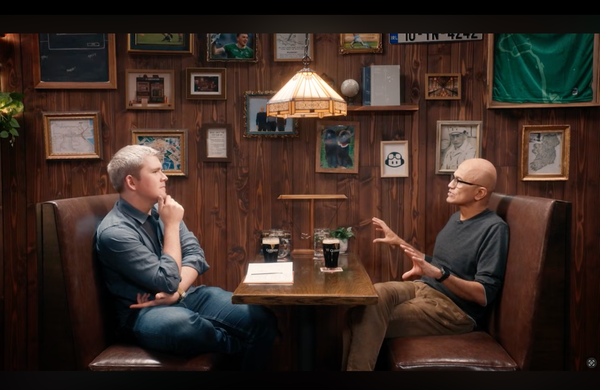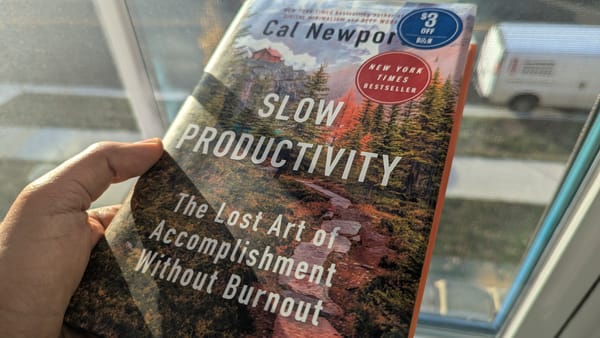Ezra Klein & Derek Thompson: Building Abundance and Reshaping American Politics
New perspectives usually don't come from your usual suspects or rather your usual podcasts! and in some cases, the same podcasts, but not the typical guests you usually listen to.
This conversation is one.
Definitely well exposed in their own rights, and in the podcast world too.
Lex of the Lex Fridman Podcast fame, who's known for diving deep with fascinating people across science, tech, and big ideas, brought together two great thinkers, this time from the liberal left: Ezra Klein and Derek Thompson.
Ezra's voice is a voice to pay attention to, whether reading his New York Times column or remembering his work building Vox. And Derek, a sharp writer for The Atlantic and the host of Plain English Podcast, is equally insightful. They joined Lex to chat about their new book, Abundance, and it turned into a really thought-provoking discussion about the underlying forces shaping our politics in 2025 and beyond.
The Abundance Agenda: Building a More Plentiful Future
What if we're standing in our own way, preventing progress and prosperity not because we lack resources or ideas, but because of outdated systems and a fear of building? Ezra Klein and Derek Thompson joined Lex Fridman to explore this powerful question, arguing for a new approach they call "supply-side progressivism".
- Liberals and Conservatives: Different Fears, Values, and Tolerances
They kicked off by exploring the fundamental divides between the left and the right in American politics. It's more than just policy disagreements; it's about what each side fundamentally fears, values, and tolerates. They suggested that liberals tend to fear injustice and value change, sometimes tolerating a bit of overreach to push society forward. Conservatives, on the other hand, often fear cultural radicalism and the destruction of society, valuing tradition and sometimes tolerating a degree of injustice. This archetypal difference shapes everything from their views on government size to their approaches to solving problems. ⏰ 32:30
- The Shifting Landscape of Political Power
The conversation then shifted to the current state of the Democratic and Republican parties. On the right, they see a party largely centralized around Donald Trump, who disrupted traditional power structures and interest groups. The Democratic Party, however, appears more fragmented and leaderless in this moment, lacking a clear successor and struggling with internal disagreements. They observed that modern parties often gain force from a central personality, and without that, the Democratic Party currently feels adrift. ⏰ 18:08
- Attention, Not Just Money, as Political Currency
One of the really insightful points they made was about the changing currency of politics: it's increasingly about attention, not just money. They contrasted how the Trumpist right has mastered generating attention, even negative attention, by being the product themselves and embracing conflict for agenda control. They suggested that many Democrats, by contrast, are still optimized for an older media era, prioritizing avoiding negative attention over generating volume, which makes them hesitant to engage in unstructured conversations or put their personalities forward in the same way. ⏰ 32:32
- The Scarcity Mindset: A Self-Inflicted Wound
A core theme from their book Abundance is the idea of "manufactured scarcity". They argued that many of the problems we face, particularly in areas like housing, are not due to genuine limitations but are outcomes of rules, regulations, and processes that we ourselves have created. They shared stories and examples illustrating how these self-imposed obstacles prevent us from building enough homes, developing clean energy projects, or even distributing essential resources efficiently, leading to unnecessary scarcity. ⏰ 36:38
- Housing as the Frontier of Economic Opportunity
They dove deep into the housing crisis, framing it not just as an affordability issue, but as a blockage of the American frontier of economic opportunity. They argued that cities have always been the places where ideas and economic dynamism are produced because they bring diverse people together to compete and cooperate. By making it incredibly expensive and difficult to build housing in productive cities, we are effectively preventing people from accessing these opportunities and hindering the kind of intellectual and economic ferment that drives progress. ⏰ 01:19:17
- Everything Bagel Liberalism and the Failure to Build
They introduced the concept of "everything bagel liberalism," a vivid metaphor for how good intentions and the desire to solve multiple problems simultaneously can inadvertently paralyze progress. They explained that by layering on countless requirements and agendas onto single projects, like building new housing, the process becomes so complex and burdensome that nothing gets built at all. They argued that this procedural fetish has made liberalism, which historically was about building big things, an ideology of blocking. ⏰ 01:44:26
- Reclaiming a Politics Focused on Outcomes
Ezra and Derek emphasized the need for a liberalism that is ruthlessly obsessed with outcomes rather than just processes. They contrasted the clear, quantifiable feedback loops in the private sector that drive efficiency with the often murky and slow feedback loops in government. They argued that without clearly articulated goals and a focus on achieving them, government initiatives, even well-funded ones, can fail to deliver results, citing the example of a rural broadband program bogged down by bureaucratic stages. ⏰ 01:50:34
- The Promise of Abundance and the Hope for the Future
Despite the frustrations with political and institutional inertia, both Ezra and Derek expressed optimism rooted in the potential for abundance, particularly through scientific and technological advancement. They highlighted exciting developments in areas like biomedical science, seeing the potential for significant breakthroughs that could transform human health and well-being. They believe that by removing self-imposed barriers and focusing on building and creating, we can unlock a future of greater prosperity and solve some of our most pressing challenges. ⏰ 03:06:28
- The Courage to Be Heard
The conversation also touched on the reluctance of some figures, particularly on the left, to engage in unstructured, long-form conversations. They speculated that this might stem from a fear of missteps in an unforgiving media environment or simply being unused to this format compared to more controlled appearances. They suggested that overcoming this requires a willingness to take risks and a belief, like Bernie Sanders has, in the importance of simply having something to say and finding platforms where people are willing to listen for a while.
- Navigating an Unsettled Political Moment
They discussed the current political period as an unsettled, liquid moment of realignment, where old certainties are breaking down. They argued that in such a time, clinging to rigid coding of people and platforms is less useful than engaging with those who have something interesting to say about the present moment. They believe that the political landscape is open for new ideas and approaches that can adapt to the current era of anti-establishment sentiment. ⏰ 00:54:54
- Fighting for a Better Future
Ultimately, the conversation circled back to the idea that creating a future of abundance isn't a passive hope, but an active fight. It requires challenging existing norms, reforming institutions, and being willing to engage with complex problems head-on. Their work, through their book and their platforms, is a call to action to embrace a politics of building and to unlock the incredible potential that exists for a more abundant world.
Ezra Klein and Derek Thompson - On "Abundance" - their new book, a "manifesto" for liberals



